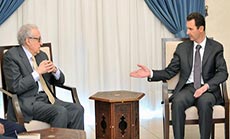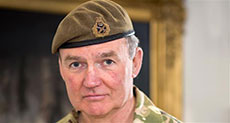
CNN Study: Rise of Al-Qaeda in Syria, Al-Nusra Most Effective

Local Editor
CNN reported Tuesday that Jabhat al-Nusra extremist group with links to al-Qaeda has become the most effective of the different rebel factions fighting in Syria.
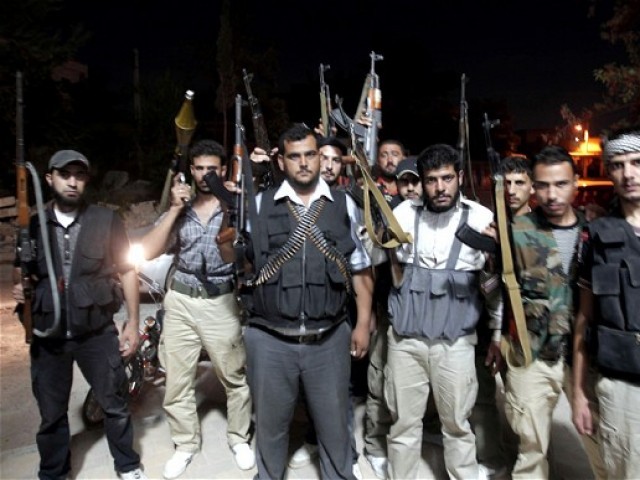 According to a new analysis, al-Nusra, that includes around some 5,000 fighters, was designated an al-Qaeda. "It is led by veterans of the Iraqi insurgency and has shown itself to be the principal force against [Syrian President Bashar al-Assad."
According to a new analysis, al-Nusra, that includes around some 5,000 fighters, was designated an al-Qaeda. "It is led by veterans of the Iraqi insurgency and has shown itself to be the principal force against [Syrian President Bashar al-Assad."
CNN obtained an advance copy of the analysis, set to be released by the Quilliam Foundation, a counterterrorism policy institute based in London.
"The civil war in Syria is a gift from the sky for al-Nusra; they are coasting off its energy," the lead author of the report, Noman Benotman, told CNN.
Benotman, a former prominent Libyan extremist who was personally acquainted with al-Qaeda's top leaders including Osama bin Laden and Ayman al-Zawahiri, consulted Western and regional intelligence officials as well as extremist and Takfiris in Syria, including al-Nusra sources.
Meanwhile, the study warns that al-Nusra fuels anxiety in Western capitals that a powerful al-Qaeda affiliate may become entrenched in the heart of the Arab world...and a new threat to international security.
Al-Nusra, according to the report, is a Syrian offshoot of al-Qaeda in Iraq, aka AQI, the terror outfit founded by the Jordanian Abu Musab al-Zarqawi.
AQI was rebranded from Iraq extremist groups after al-Zarqawi was killed by a US missile strike in 2006.
"The AQI emir Abu Du'a is in control of both AQI and al-Nusra. He also issues strategic guidance to al-Nusra's emir, Abu Muhammad al-Jawlani, and tasked him to begin operations in Syria," the US State Department said.
In parallel, Benotman clarified that while Abu Du'a still has significant influence over al-Nusra, the key player in the group is al-Jawlani, a veteran Syrian Takfiri who he says appears to have almost certainly been a former close associate of al-Zarqawi.
Al-Jawlani's "leadership is uncontested because of his experience in Iraq," the Quilliam Foundation report found. According to Benotman, al-Jawlani has taken painstaking measures not to reveal his real identity - including wearing a mask to meetings with some of al-Nusra's senior operatives. He was also masked when al-Nusra released a video in January 2012 to announce its formation.
Moreover, the study revealed that al-Zarqawi's Syrian commanders were also the key channel for financial contributions from the Saudi and Gulf region.
One Syrian among the inner circle of AQI was Sulayman Khalid Darwish. He's been reported killed in Iraq, but intelligence sources tell CNN his fate remains uncertain, raising the possibility he may now be playing a leadership role in al-Nusra.
According to Benotman, the ultimate aim of al-Nusra is the creation of an Extremist State in Syria and the Levant. To begin with, it is set about recruiting fighters and training them, collecting weapons and creating safe havens.
However, the group suffered a severe setback in April 2012 after the arrest of an operative led to a significant number of members being detained in Damascus. "Nevertheless, the group subsequently rebuilt its operations, placing greater emphasis on operational security," Benotman told CNN.
One precaution al-Nusra has taken is communicating through messengers rather than electronically, according to Benotman. "Their operational security is some of the best I've ever seen," he told CNN.
In addition, al-Nusra is "very selective about initiating new members, requiring "tezkiyya," or personal assurance, from two commanders on the front line stating that the recruit has the necessary skills, religious commitment and attitude to join the group," the Quilliam study mentioned.
According to the US State Department, al-Nusra has claimed responsibility for nearly 600 attacks - "ranging from more than 40 suicide attacks to small arms and improvised explosive device operations - in major city centers including Damascus, Aleppo, Hama, Dara, Homs, Idlib, and Dayr al-Zawr."
Benotman also mentioned that the group has also carried out executions of media professionals and assassinations of military officers and supporters of al-Assad.
Al-Nusra's signature tactic, like that of AQI, is using large car and truck bombs driven by suicide bombers. The group has launched several such attacks against security installations in Damascus and Aleppo, sometimes as part of a coordinated assault involving gunmen.
Last week al-Nusra demonstrated the lethality of a new tactic - driverless car bombs operated by remote control, Benotman told CNN.
This comes as al-Nusra includes a significant number of fighters from other Arab countries. In recent months a growing number have arrived from Saudi Arabia and the Gulf, but Iraqis and Jordanians constitute the majority of foreign fighters.
In another context, Western analysts believed that al-Nusra's hostility to the West could create an "over-the-horizon" threat to the United States and its allies if the group is able to secure a foothold in Syria and across the Levant.
"The longer the conflict goes on, the stronger they will get," Benotman told CNN.
Source: CNN, Edited by moqawama.org
Comments
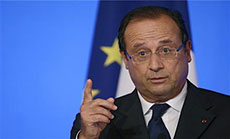
France’s Hollande in Qatar for Warplane Deal
9 years ago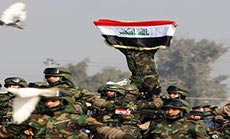
Iraq Police Dismantles Al-Qaeda Protest Site
10 years ago